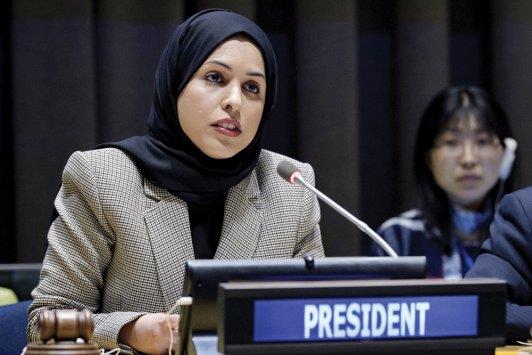
DIFI forum examines work-life balance on family dynamics
(MENAFN- The Peninsula)
The COVID-19 lockdowns have forced organisations worldwide to let their employees work from home, significantly changing how people work.
This new dynamic has shown the feasibility of applying flexible arrangements to many workplaces without compromising output, and highlighted the practicality of a new paradigm that is productive and promotes a better work-family balance.
In line with this development, Doha International Family Institute (DIFI) — a member of Qatar Foundation — in collaboration with the Permanent Mission of the State of Qatar to the United Nations held a forum titled ‘Family Relations and Flexible Work Arrangements: The Way Forward’.
The forum opened with an introductory remark by H E Ambassador Sheikha Alya Ahmed Saif Al Thani, Permanent Representative of the State of Qatar to the UN, followed by a welcome remark by Dr. Sharifa Noaman Al Emadi, Executive Director, DIFI.
Speaking about Qatar’s initiatives to support the family, Ambassador Sheikha Alya Ahmed Saif Al Thani said:“The State of Qatar recognises the central role of the family in social development and pays particular attention to supporting and empowering this basic social unit.”
She cited DIFI as one of Qatar’s institutions advocating for policies and practices that promote work-life balance, which contributes to the improved physical and mental health wellbeing of societies.
In a recent DIFI report on the Impact of COVID-19 on Family Cohesion in Qatar, 64 percent of the surveyed participants experienced positive improvements in their relationships with family members.
Reflecting on the outcome of the study, Dr. Al Emadi, said:“In research conducted by DIFI in 2019, one of the major recommendations was to introduce flexible working arrangements, which were implemented by default with the pandemic. COVID-19 presented an opportunity for families to reshape their relationships.”
The event also included a high-level panel discussion, featuring H E Dr. Ahmed bin Mohammed Al Muraikhi, Special Adviser to the UN Secretary-General; Khalid Al Naama, Family Policy Director, DIFI; and Dr. Sara Ali Abdulla, Research Fellow, Qatar Biomedical Research Institute, part of Hamad Bin Khalifa University. The panel was moderated by Renata Kaczmarska, Focal Point on the Family, DISD, DESA, UN.
Sharing her insight on family and parenting support, Kaczmarska said:“The pandemic presented families with new challenges and highlighted their irreplaceable role as economic and care providers. These roles need stronger support from governments and the private sector.”
The discussed topics were taken from the perspective of the UN, academics, policymakers, youth, and parents. Dr. Abdulla highlighted the benefits of flexible working arrangements on personal growth and productivity, and its impact on both parents and children. She shared her personal experience and how the most impactful events in her career and personal lives were a result of flexible working arrangements.
The discussion also provided an overview of policies and procedures practiced worldwide in terms of implementing flexible work arrangements, and how such structures positively impact relations, parental roles, responsibilities, and gender equality within the family sphere.
“There is a wealth of evidence to support the benefits of flexible working, and the UN is leading by example in providing the maximum flexibility for its staff, while continuing to maintain international peace and security, protecting human rights, delivering humanitarian assistance, and supporting sustainable development and climate action,” said Dr. Muraikhi.
Al Naama said:“There are several policies that could help stabilize families, such as adopting flexible hours, providing nurseries and breastfeeding rooms in the workplace, and offering part-time contracts. We, at DIFI, renew our call for adopting family-friendly policies, which could provide a more viable model for giving stability to families.”
This forum is part of DIFI’s Doha Briefing initiative, which aims to provide a platform for governments, civil society, and UN entities to engage in a dialogue to develop a better understanding of the progress made by families and the challenges they face, and to exchange valuable lessons concerning new evidence and innovations targeting families.

Legal Disclaimer:
MENAFN provides the
information “as is” without warranty of any kind. We do not accept
any responsibility or liability for the accuracy, content, images,
videos, licenses, completeness, legality, or reliability of the information
contained in this article. If you have any complaints or copyright
issues related to this article, kindly contact the provider above.


















Comments
No comment